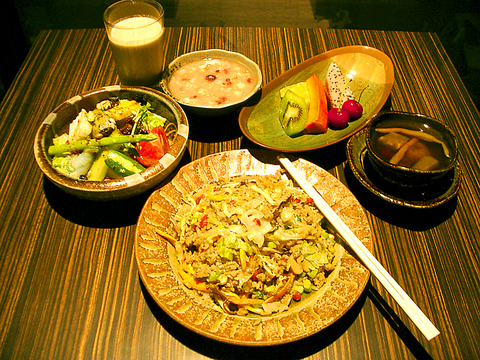There is no shortage of vegetarian restaurants in Taipei and there is definitely no shortage of McDonald's either, but it's not often you find one on top of the other. Above the golden arches on Tianmu West Road is the relaxing, ironic location of the latest in a chain of vegetarian restaurants. Open for nearly three months, Easy House provides a healthy mix of Eastern and Western cuisine at reasonable prices.
The menu is a fusion of Chinese, Japanese and Mediterranean fare and offers an assortment of casseroles, hot pots and stir-fries in addition to rice and noodle dishes.
The best way to sample what the restaurant has to offer is to opt for one of three set meals. Each set comes with a considerable amount of food and includes an energy juice, salad, soup, main entree, fruit plate, desert and tea. Sets costs either NT$360 or NT$420, depending on the main course.

PHOTO CREDIT: DIANA FREUNDL, TAIPEI TIMES
While the Brazilian vegetable milk casserole looked and smelled tempting, the thought of a hot pot in the summer stopped me from ordering it. Instead, I choose to try the wild mushroom noodles and fried rice with truffle sauce (each NT$220 without the set) -- the rosemary vegetable stir-fry and Sichuan tofu casserole also came highly recommended by the staff.
The energy drink was rich with fruit, but also rich with wheat germ, which gave it a grainy texture. The salad, made with fresh vegetables and various greens, was seasoned with nuts, beans and Japanese sesame dressing.
Both of the main dishes were great selections, which would make having to choose only one a pleasant yet time-consuming process. The noodles were cooked in a fresh basil sauce and served with tomatoes and Portobello mushrooms. The truffle-fried rice was a successful mix of asparagus, lily petals, and wild mushrooms in a light Italian truffle sauce. Although there was barely room for it, after the main course I was served a small plate of assorted fruit and a bowl of sweet congee with dates and lotus seeds.
The lunch and dinner portions are the same, which is an intimidating amount of food for a small appetite, but still well-worth the effort. Any of the dishes can be ordered separately, including the main courses, and there is also a short list of herbal teas, fruit shakes and desserts for afternoon tea.

One of the biggest sore spots in Taiwan’s historical friendship with the US came in 1979 when US president Jimmy Carter broke off formal diplomatic relations with Taiwan’s Republic of China (ROC) government so that the US could establish relations with the People’s Republic of China (PRC). Taiwan’s derecognition came purely at China’s insistence, and the US took the deal. Retired American diplomat John Tkacik, who for almost decade surrounding that schism, from 1974 to 1982, worked in embassies in Taipei and Beijing and at the Taiwan Desk in Washington DC, recently argued in the Taipei Times that “President Carter’s derecognition

This year will go down in the history books. Taiwan faces enormous turmoil and uncertainty in the coming months. Which political parties are in a good position to handle big changes? All of the main parties are beset with challenges. Taking stock, this column examined the Taiwan People’s Party (TPP) (“Huang Kuo-chang’s choking the life out of the TPP,” May 28, page 12), the Democratic Progressive Party (DPP) (“Challenges amid choppy waters for the DPP,” June 14, page 12) and the Chinese Nationalist Party (KMT) (“KMT struggles to seize opportunities as ‘interesting times’ loom,” June 20, page 11). Times like these can

June 23 to June 29 After capturing the walled city of Hsinchu on June 22, 1895, the Japanese hoped to quickly push south and seize control of Taiwan’s entire west coast — but their advance was stalled for more than a month. Not only did local Hakka fighters continue to cause them headaches, resistance forces even attempted to retake the city three times. “We had planned to occupy Anping (Tainan) and Takao (Kaohsiung) as soon as possible, but ever since we took Hsinchu, nearby bandits proclaiming to be ‘righteous people’ (義民) have been destroying train tracks and electrical cables, and gathering in villages

Dr. Y. Tony Yang, Associate Dean of Health Policy and Population Science at George Washington University, argued last week in a piece for the Taipei Times about former president Ma Ying-jeou (馬英九) leading a student delegation to the People’s Republic of China (PRC) that, “The real question is not whether Ma’s visit helps or hurts Taiwan — it is why Taiwan lacks a sophisticated, multi-track approach to one of the most complex geopolitical relationships in the world” (“Ma’s Visit, DPP’s Blind Spot,” June 18, page 8). Yang contends that the Democratic Progressive Party (DPP) has a blind spot: “By treating any